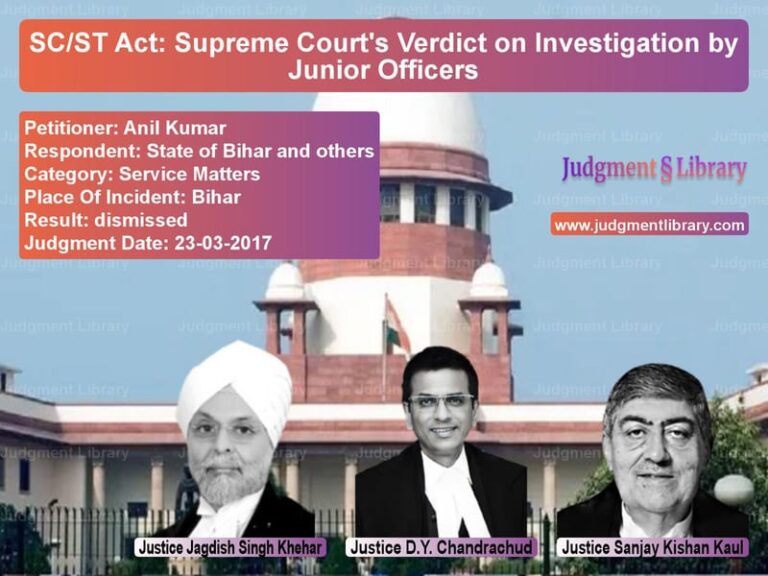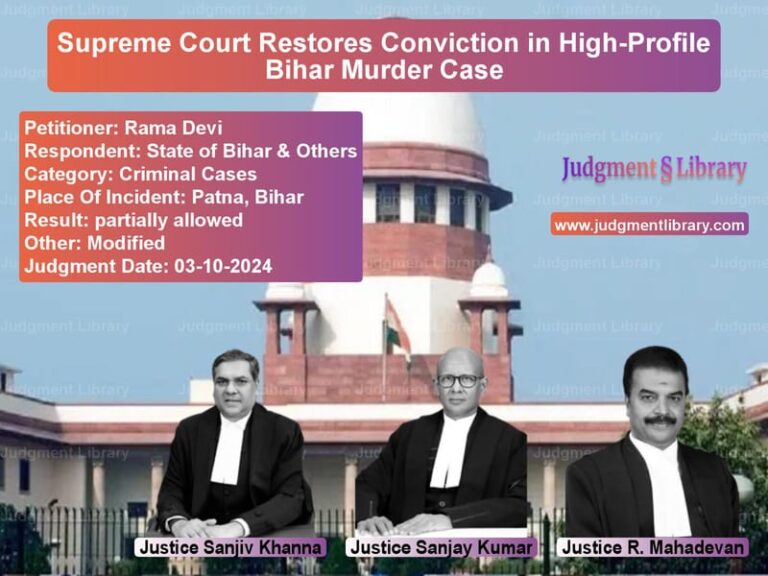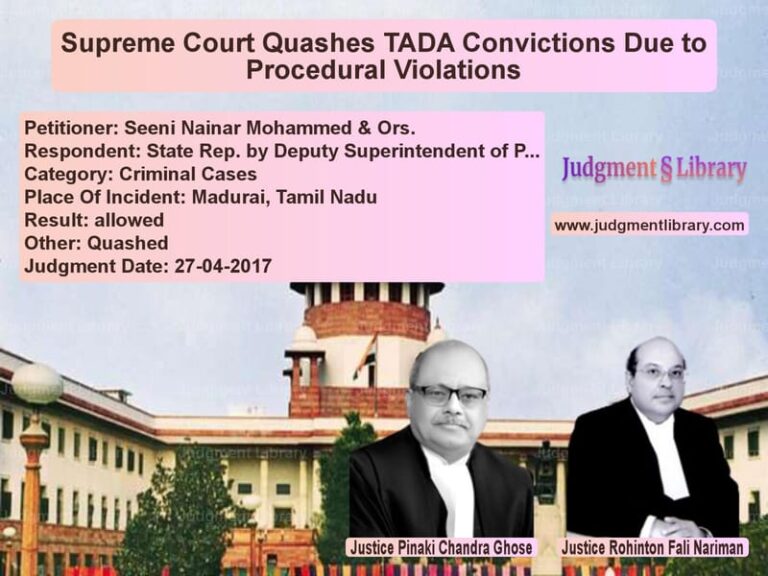Supreme Court Upholds Entry Tax on Industrial Areas: OCL India Ltd. vs. State of Orissa
The case of OCL India Ltd. vs. State of Orissa is a landmark judgment concerning the applicability of entry tax to industrial areas and self-governed townships. The Supreme Court examined whether industrial townships, which are excluded from municipal governance under Article 243-Q of the Constitution, could still be considered ‘local areas’ for the purpose of imposing entry tax under Entry 52 of the State List. This case has significant implications for businesses operating in industrial townships, as it clarifies the scope of state taxation powers over such areas.
Background of the Case
The State of Orissa introduced the Orissa Entry Tax Act, 1999, which levied tax on the entry of goods into local areas. OCL India Ltd., a leading cement manufacturer, along with other industrial entities, challenged the levy of entry tax on the grounds that their industrial townships were not ‘local areas’ under the Constitution. They contended that since these areas were specifically exempt from municipal governance, they could not be treated as local areas for taxation.
The Orissa High Court ruled in favor of the state government, upholding the validity of the entry tax. Dissatisfied with this ruling, OCL India Ltd. and other petitioners approached the Supreme Court, arguing that the judgment violated constitutional principles and Supreme Court precedents on the definition of local areas.
Key Legal Issues
The Supreme Court was tasked with addressing several legal questions:
- Whether industrial townships, which are not governed by municipal bodies, can still be classified as ‘local areas’ under Entry 52 of the State List.
- Whether the levy of entry tax on such industrial townships violates constitutional provisions.
- Whether the exemption of industrial townships from municipal governance under Article 243-Q implies their exclusion from state taxation.
- Whether prior Supreme Court judgments, such as in the Diamond Sugar Mills Ltd. vs. State of Uttar Pradesh case, apply to this case.
Arguments by the Petitioner (OCL India Ltd.)
The petitioners argued that:
- Industrial townships, as defined under Article 243-Q of the Constitution, are excluded from municipal governance and therefore do not fall under the term ‘local areas.’
- The Orissa Entry Tax Act violates Article 14 (Right to Equality) and Article 19(1)(g) (Right to Practice Any Profession) by imposing an unfair tax burden on businesses operating in industrial townships.
- The Constitution Bench ruling in Diamond Sugar Mills Ltd. vs. State of Uttar Pradesh (1961) established that a ‘local area’ must be one administered by a municipal authority, and since industrial townships are excluded from such governance, they cannot be taxed under Entry 52.
- The Orissa High Court misinterpreted the constitutional provisions and failed to recognize the special status granted to industrial townships.
- The entry tax creates an artificial distinction between industrial areas and municipal areas, which is discriminatory.
Arguments by the Respondent (State of Orissa)
The State of Orissa defended the entry tax, arguing:
- Industrial townships continue to be part of the state and enjoy state-provided infrastructure and public services, making them liable for taxation.
- The exclusion of industrial townships from municipal governance does not mean they are exempt from all forms of state regulation, including taxation.
- The term ‘local area’ should be interpreted broadly to include all areas within the territorial jurisdiction of the state.
- Entry tax is imposed to ensure that businesses contribute to the upkeep of public infrastructure from which they benefit.
- The petitioners’ reliance on Diamond Sugar Mills Ltd. was misplaced, as that case dealt with factory premises, not industrial townships.
Supreme Court’s Observations
The Supreme Court examined the scope of ‘local area’ and the relevance of Article 243-Q. The Court made several important observations:
“The exclusion of industrial townships from municipal governance does not mean they cease to be part of the state’s territorial jurisdiction. The term ‘local area’ must be interpreted in the context of state taxation powers.”
Regarding the reliance on Diamond Sugar Mills Ltd., the Court distinguished the present case by stating:
“The ruling in Diamond Sugar Mills applied to factory premises, not industrial townships. These are distinct categories with different administrative functions.”
Judgment Outcome
The Supreme Court dismissed the appeals and upheld the validity of the entry tax, ruling:
- Industrial townships qualify as ‘local areas’ for taxation purposes under Entry 52 of the State List.
- The exclusion from municipal governance does not exempt industrial townships from state taxation.
- The levy of entry tax on industrial townships is constitutionally valid and does not violate fundamental rights.
- The interpretation of ‘local area’ must align with the broader taxation powers of the state, ensuring uniformity in fiscal policies.
Key Takeaways from the Judgment
- The ruling clarifies that industrial townships remain subject to state taxation despite their exclusion from municipal governance.
- It establishes a broad interpretation of ‘local area’ under Entry 52 of the State List.
- It affirms that state governments have the power to impose entry tax to ensure the equitable distribution of tax burdens.
- Businesses operating in industrial townships must comply with entry tax regulations, ensuring that they contribute to state revenue and public infrastructure maintenance.
Conclusion
The Supreme Court’s decision reinforces the principle that taxation laws apply uniformly across different administrative regions. Industrial townships, despite their self-governing status, remain an integral part of the state’s fiscal structure and are subject to entry tax. The judgment has far-reaching implications for industrial taxation policies across India, ensuring that businesses contribute to the financial sustainability of the states where they operate.
Petitioner Name: OCL India Ltd..Respondent Name: State of Orissa.Judgment By: Justice Uday Umesh Lalit, Justice S. Ravindra Bhat, Justice J.B. Pardiwala.Place Of Incident: Orissa.Judgment Date: 03-11-2022.
Don’t miss out on the full details! Download the complete judgment in PDF format below and gain valuable insights instantly!
Download Judgment: ocl-india-ltd.-vs-state-of-orissa-supreme-court-of-india-judgment-dated-03-11-2022.pdf
Directly Download Judgment: Directly download this Judgment
See all petitions in Income Tax Disputes
See all petitions in Tax Evasion Cases
See all petitions in Tax Refund Disputes
See all petitions in Customs and Excise
See all petitions in Judgment by Uday Umesh Lalit
See all petitions in Judgment by S Ravindra Bhat
See all petitions in Judgment by J.B. Pardiwala
See all petitions in dismissed
See all petitions in supreme court of India judgments November 2022
See all petitions in 2022 judgments
See all posts in Taxation and Financial Cases Category
See all allowed petitions in Taxation and Financial Cases Category
See all Dismissed petitions in Taxation and Financial Cases Category
See all partially allowed petitions in Taxation and Financial Cases Category







